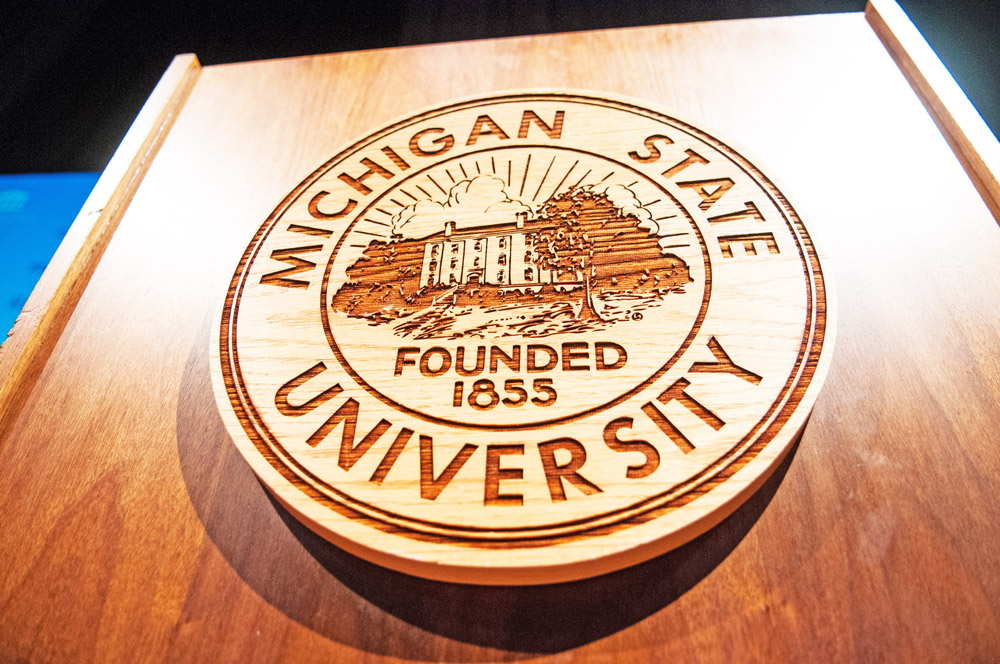
Professor Kiwan Kang utilizes a tech kart in Anthony Hall. In preparation for the fall 2020 semester, classroom support and AV/IT teams within Academic Technology equipped nearly 200 classrooms with the technology to allow faculty to provide a hybrid instruction model.
While COVID-19 has temporarily altered the way we operate, it has highlighted MSU IT’s agility and creativity in meeting our campus partners’ service needs. Nowhere is this more apparent than in Academic Technology, where teams have had to pivot time and again to address an ever-changing landscape and do so while being mindful of MSU IT’s safety procedures and protocols.
In preparation for the fall 2020 semester, classroom support and AV/IT teams within Academic Technology equipped nearly 200 classrooms with the technology to allow faculty to provide a hybrid instruction model.
“We knew that outfitting so many classrooms in such a short amount of time would be a big challenge and we needed all hands-on deck to make it happen,“ said Academic Technology Interim Director Michael Zakhem.
When MSU announced the move to a completely online modality, the teams’ flexibility and willingness to support the faculty’s changing needs helped build new relationships and strengthen campus partnerships.
“Early on, we had a lot of faculty trying to teach from home or offices,” said Kevin Holtz, classroom support supervisor. He said his team was able to help some faculty find a comfort level utilizing Zoom for their courses.
“It takes a real team effort to do some of this stuff,“ Holtz said.
Zakhem said that level of care is core to Academic Technology’s mission.
“It’s really great to see the teams come together and flex in order to support our educators and students,“ Zakhem said. “Not only is having technology available for educators important but showing them how to use it and supporting them while using it is just as essential.”
That team effort is also needed to ensure health and safety.
“Kevin has done a great job organizing people at our location,” said Digital Classroom Services Manager Gregory Koerner. “He assigned vans to make sure each person had their own vehicle. He also made sure each individual had their own hand sanitizers and wipes.”
Holtz also reconfigured the team’s storage areas to ensure staff members followed the recommended 6-feet of separation.
The safety of students, faculty, and staff was at the forefront of Academic Technology’s decision to ship close to 350 microphone elements to faculty before the fall semester as part of online learning preparations.
Koerner said his team has always provided faculty and students with the equipment when new needs arise, but due to COVID-19, the specific needs have changed.
“We are building a partnership with a couple of Chemistry faculty members using new equipment,” Koerner said. “Kevin created almost like a mobile recording kart for them to use.”
Holtz said his team worked with the chemistry faculty for every recording early on and helped them build the confidence to where they’ve now become more independent.
“They’ve been very thankful,” Holtz said. “It feels good to build a relationship with the faculty. It’s a cool experience when you get to work alongside them; it’s an entirely different experience.”
Koerner said his team enjoys the new experiences, even if it comes with a little extra work.
“During non-COVID times, calls usually don’t last longer than 20 minutes,” Koerner said. “The time spent with faculty now is significantly longer.”
Some faculty have elected to utilize the new technology and teach from empty classrooms, proving the work performed over the summer to be invaluable.
“Even though faculty aren’t utilizing the classrooms in the volume, we thought, they are in the best working shape they’ve been in a long time,” Koerner said. “Vi’Nessa Webster developed an excellent workflow and check sheet to ensure classrooms are in good working order with the hybrid tech in there.”


